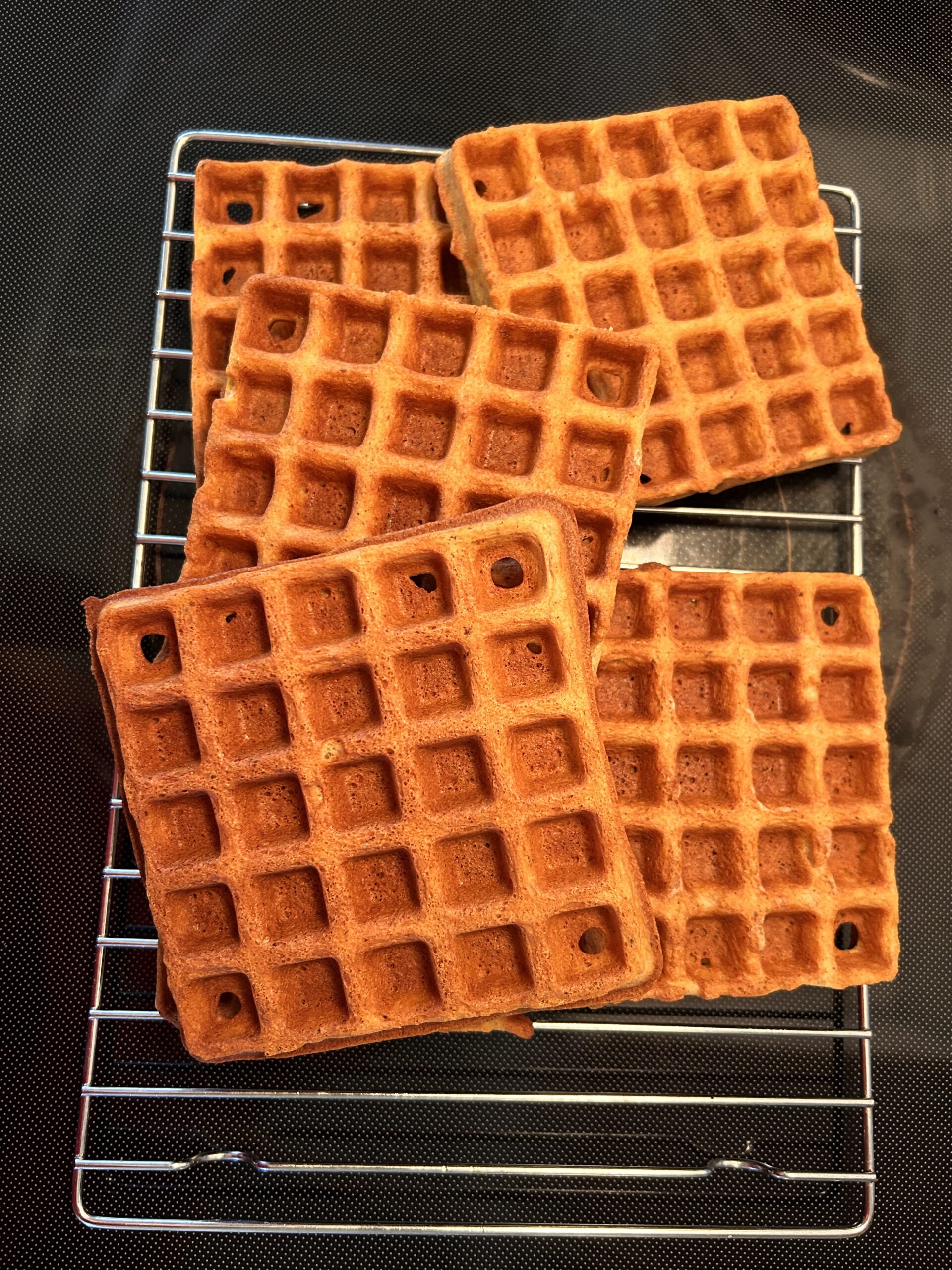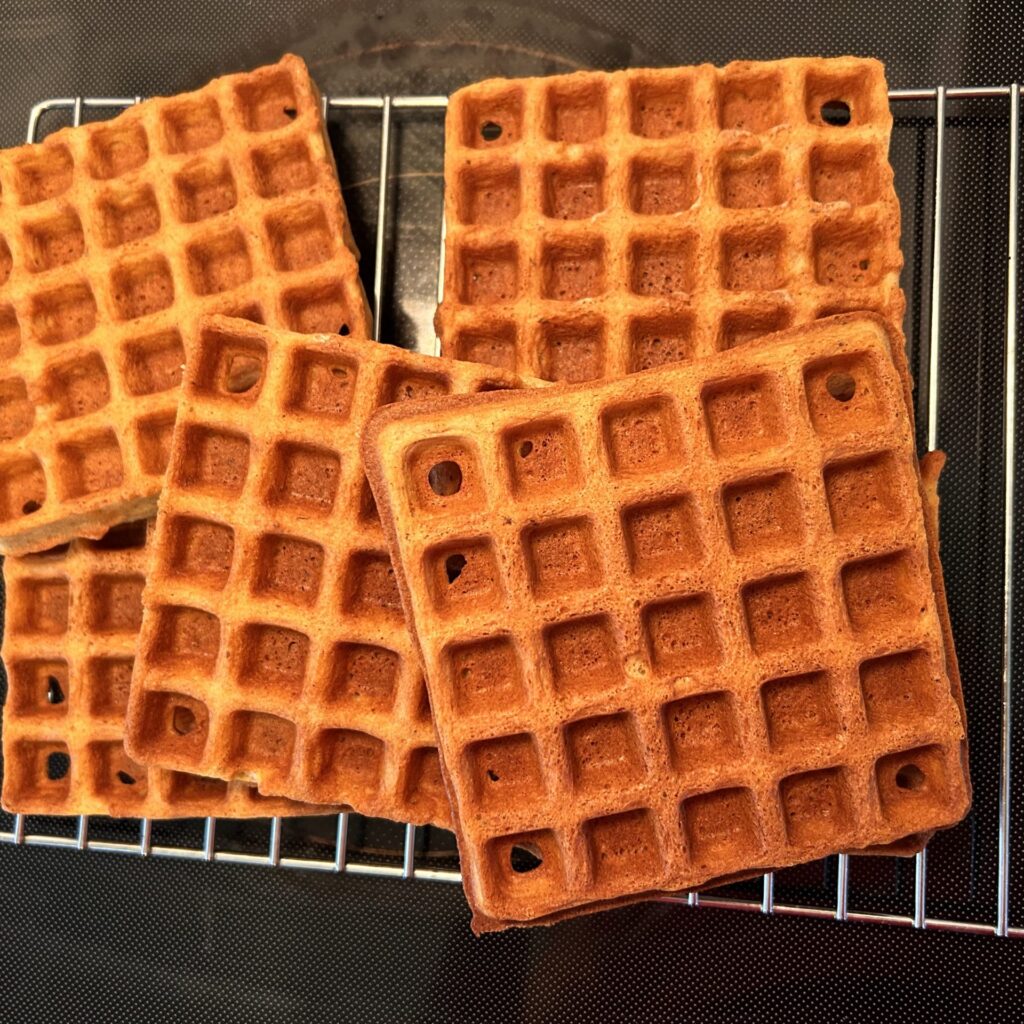Ingredients:
- 1 cup + 2 tbsp cassava flour
- 1 tbsp baking powder
- 2 tbsp flax seeds (optional)
- 6 scoops protein powder (optional)
- 1 tsp cinnamon
- 1/4 tsp salt
- 2 eggs
- 3 tbsp melted ghee (butter or dairy free alternative like coconut oil)
- 2 tsp vanilla extract
- 1 1/4 cup oat milk (or milk/milk alternative)
Instructions:
- Preheat your waffle griddle
- In a large mixing bowl, whisk together the cassava flour, baking powder, flax seeds, protein powder, cinnamon and salt.
- In a separate bowl, whisk together the eggs, add the oat milk, melted ghee (or coconut oil), and vanilla extract.
- Pour the wet ingredients into the dry ingredients and stir until just combined. Be careful not to overmix; a few lumps are okay.
- Let the batter rest for a few minutes to allow the cassava flour to absorb the liquid. If the batter is too thick, you can add a little more oat milk to reach your desired consistency.
- Lightly grease your griddle with ghee, or coconut oil using a cooking brush.
- Pour batter onto the waffle griddle for each one depending on the size (usually 1/4 cup). My griddle cooks each waffle on both sides after 4 mins.
- Repeat the process until all the batter is used.
- Serve the cassava flour waffles warm with your favorite toppings, such as maple syrup, fresh fruit, or yogurt.
Nutrition Facts (Approximate, per serving):
- Serving Size: 1/6th of the recipe
- Calories: 145
- Total Fat: 2.2g
- Total Carbohydrates: 25g
- Dietary Fiber: 2.2g
- Sugars: 2g
- Protein: 8g
Why is Cassava Flour Better Than Refined White Flour?
- Gluten-Free:
- Cassava flour is naturally gluten-free, making it suitable for individuals with gluten sensitivity or celiac disease.
- Nutrient Content:
- Cassava flour retains more nutrients compared to refined white flour. Cassava is a good source of fiber, vitamin C, manganese, and folate. In contrast, the refining process for white flour removes most of the bran and germ, resulting in a loss of many essential nutrients.
- Resistant Starch:
- Cassava contains resistant starch, which acts similarly to dietary fiber. Resistant starch has positive effects on digestive health, including promoting the growth of beneficial gut bacteria.
- Low Glycemic Index:
- Cassava flour has a lower glycemic index compared to refined white flour. Foods with a lower glycemic index are absorbed more slowly, leading to a slower and steadier rise in blood sugar levels. This can be beneficial for blood sugar control especially folks with diabetes or insulin resistance.
- Diverse Culinary Uses:
- Cassava flour has a mild flavor and fine texture, making it suitable for various culinary applications. It can be used as a one-to-one substitute for wheat flour in many recipes, including baking and cooking. This versatility allows for the creation of gluten-free alternatives without compromising on taste and texture.
- Potential Health Benefits:
- Cassava consumption is associated with certain health benefits, such as antioxidant properties, anti-inflammatory effects, and potential effects on metabolic health.
- Sustainable Crop:
- Cassava is a hardy and drought-resistant crop that grows well in tropical regions. Its cultivation requires fewer inputs compared to some other grains, making it a sustainable option.




